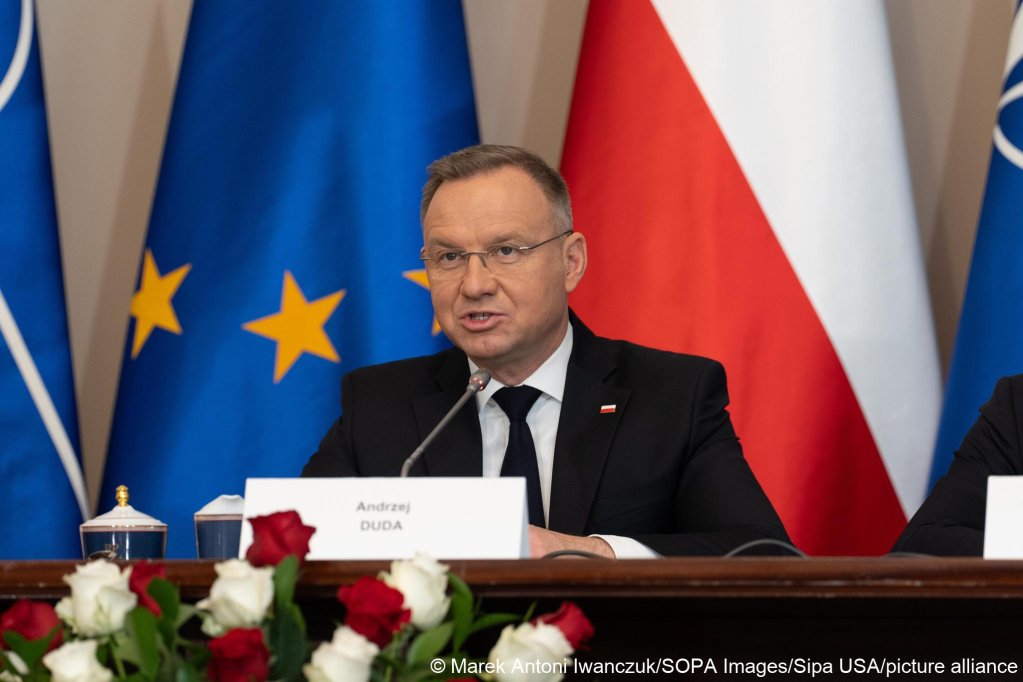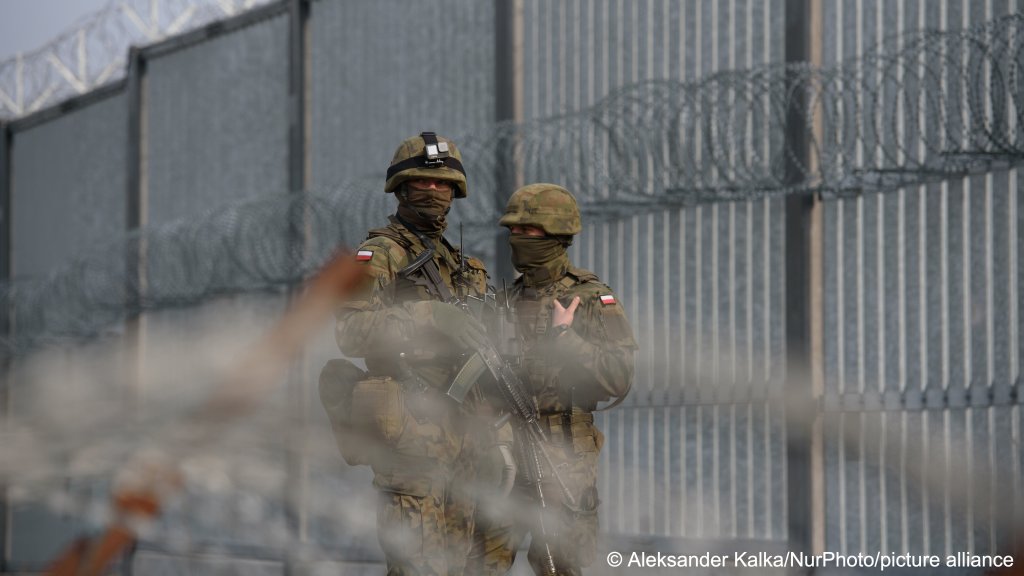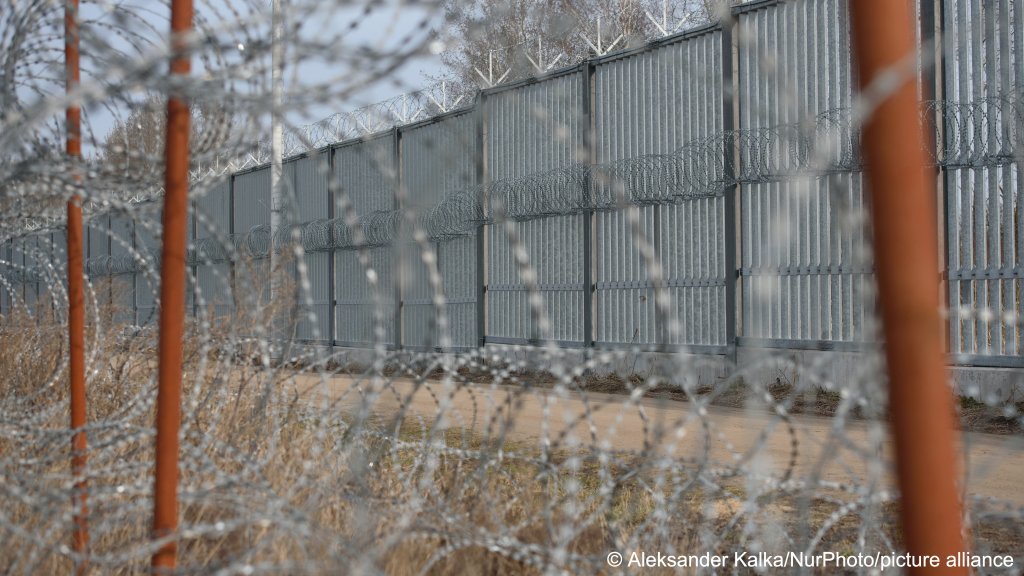On March 26, Polish President Andrzej Duda signed a new asylum law. The bill allows Poland to temporarily suspend the right to asylum, and is also designed to strengthen migration policy across the country, including at the western border with Germany. The law has been criticized by UNHCR and several human rights groups.
"The issue of the security of Polish citizens, the protection of the borders of the Republic of Poland, as well as support for Polish soldiers and officers are the priority of my presidency," wrote Polish President Andrzej Duda in a note to the head of government, on signing an amendment to the act regarding asylum in Poland.
The new legislation allows Poland to suspend the right to asylum for 60 days at a time, and has been criticized by human rights groups, including the UN Refugee Agency, UNHCR. Extensions of that period can also be sought with specific parliamentary approval "and renewed indefinitely," warned the organization Human Rights Watch in a statement in February as the bill was being voted upon.
The Polish authorities have said that activity at the border has increased again over the last year, and say they are worried about the border being "stormed" by large groups of migrants. Last summer, a Polish soldier was killed while on border patrol. Human rights groups report the deaths of around 100 migrants in the border area between Belarus and Poland since 2021.

Things are working 'very well,' says migration minister
Just after the law was signed, the Polish border guard said on the social media platform X that it had recorded over 620 attempts to cross the border between March 28 and 30 from Belarus. "Almost all were thwarted," wrote the border guard, "three people were detained for aiding and abetting," and "15 actions are being taken against the persons in order to capture them." Help was provided to two people, the border guard added, and "a border guard vehicle was damaged."
Maciej Duszczyk, migration researcher and Undersecretary of State at the Ministry of the Interior and Administration, claimed on X on March 30 that he believed the new law was "working very well." He claimed that "recently, applications for asylum from citizens from Eritrea, Somalia and Guinea have not been accepted."
Read AlsoPoland moves to tighten asylum rules and accelerate deportations
Law 'flies in the face of Poland's international and EU obligations'
In February, when the bill was being voted through parliament, UNHCR warned that such a suspension would not be compatible with international or European asylum law.
Poland’s Commissioner for Human Rights, Marcin Wiacek, wrote to Duda while he was deciding whether to sign off on the bill, and reportedly asked Duda to consider whether the "legislation raises fundamental concerns regarding its compliance with the Constitution of the Republic of Poland, as well as international law," reported Notes from Poland.
Moreover, the organization Human Rights Watch in February called on the EU to take legal action against Poland on the implementation of the bill. HRW said at the time that the bill "flies in the face of Poland’s international and EU obligations."

The organization reminded Poland that, since it currently holds the rotating EU presidency, it should "lead by example and ensure that people fleeing war and persecution are given the opportunity to have their asylum claims individually assessed," said Lydia Gall, Senior Europe and Central Asia researcher at Human Rights Watch on February 19.
According to HRW, the bill "risks formalizing ongoing unlawful and abusive pushbacks at Poland’s border with Belarus." The organization added that if passed, the bill could "expose people to abuses and inhumane conditions in Belarus, in violation of the principle of nonrefoulement, which prohibits returns to a country where people may face torture or inhumane or degrading treatment."
Read Also Poland: Government expresses opposition to implementing EU migration pact if relocation is mandated
Duda advises Tusk to 'take active measures'
The President signed the act on March 26, a little while after the law had been voted through both houses of parliament successfully. Duda was, prior to taking up the role of President, a member of the now-opposition Law and Justice (PiS) party. Members of the current government, under Donald Tusk’s Liberal party, had been worried that the President was holding off signing the law for "political reasons."
However, in a press statement issued by the Presidency, Duda told Poland’s Prime Minister Tusk that now the law had been signed, he needed to take "active measures to protect the Polish border."
Those active measures include, as listed in the press statement, are not just centered on the Belarusian border, but also "aimed at protecting the western border, including counteracting the transfer of migrants to Poland by the German authorities."
Tusk promised last week, reported the BBC, that now signed, the bill would be adopted "without a moment's delay."
Read AlsoEU to boost security, restrict asylum rights at Russia, Belarus borders
Tension also rising at the western border with Germany
Germany is currently still in coalition talks ahead of forming a new government, following elections at the end of February this year. However, the presumed incoming Chancellor Friedrich Merz, leader of the conservative CDU party, has already said that he hopes Germany can "work with its neighbors" (including Poland) to return migrants who are already registered in other EU countries before arriving in Germany.

Germany has begun to build so-called Dublin centers, named after the EU regulation that allows EU states to return asylum seekers to the country of first registration. The aim of these centers is to speed up the process of returning so-called Dublin cases. One center opened in March in the state of Brandenburg, on Germany’s border with Poland.
In his letter to Tusk, Duda wrote, "Mr Prime Minister, I am asking you to show some courage in your actions towards the German authorities."
Hundreds of people, mostly from right-wing groups, have demonstrated on Poland’s border with Germany about being asked to take back migrants from their neighbor. An organizer at the event claimed that the EU and Germany are seeking to destroy the Polish nation by sending migrants back.
Read AlsoGermany expands Dublin deportation centers
Kacyznski: 'Germans believe they can do whatever they want'
Poland’s opposition PiS party leader Jaroslaw Kaczynski also echoed these statements at the weekend, reported Turkey’s Anadolu Agency. Standing on the border bridge between Poland and Germany, Kaczynski reportedly declared, "the Germans believe they can do whatever they want."
Kaczynski reportedly continued that German police could be "seen from the western border," and that they were "entering our territories." The politician said that "everything must be done to change this situation," claiming that "in Germany, we are still dealing with anti-Polish rhetoric."

Duda added that "today these challenges [to the border] unite all centers of power and the entire political scene." Duda said that before coming to power, Tusk and some members of his group had "unequivocally opposed, among other things, the construction of a barrier on the eastern border, the introduction of a state of emergency in parts of the Podlaskie and Lublin regions, or the adoption of regulations strengthening the protection of the state border.”
Exceptions to the law
Since coming to power in 2024, Tusk has retained most of the border and anti-migration measures established under the former PiS government.
The new law does offer exceptions for vulnerable people, including unaccompanied children, pregnant women and those who require special treatment due to their age or health. Also, any Belarusian citizens who could prove they would be at risk of “suffering serious harm” if returned to Belarus.

According to HRW, “explanatory notes to the draft law” stipulated that “border guards will assess who would qualify for exemptions.” However, HRW points out that border guards “are not trained or equipped to make such determinations, which should be made by the Office of Foreigners in Poland.”
Even before the bill came into force, migrants have testified to human rights groups working on the ground that Polish border guards allegedly ignored their requests to seek asylum.
Read AlsoGermany: Could conservative migration proposals endanger European unity?
Allegations of pushbacks at the border
The issue is difficult to investigate, since there is already an exclusion zone operating along some sections of the border which prevents either journalists or human rights organizations from entering the space closest to the Belarusian border.
HRW, as well as a recent report from organizations including Oxfam, have accused the Polish authorities of operating “unlawful and abusive pushbacks” at the border with Belarus.
The Polish government has said the law is necessary because of the "instrumentalization of migrants by Belarus and Russia." In December 2024, HRW research says its research has confirmed that "the dynamics of immigration to Poland may indeed have shifted and that many people now travel first to Moscow on tourist or student visas, then make their way to Belarus and the border with Poland."

The research also alleged that they had interviewed 22 people who told HRW that they had told Polish border officials they wanted asylum, "but that the guards instead took them to the border fence, without due process, and pushed them across to Belarus." They added that the guards used "pepper spray against them, abused them in other ways, and broke their phones."
Read AlsoPoland's Belarus border fence: A controversial deterrent
Migration in focus ahead of Polish presidential election in May
In the presidential letter published last week after the signing of the bill, Duda also asked Tusk to confirm what he is doing to "prevent negative effects from the EU’s Asylum and Migration pact" and to "obtain EU funds for securing the eastern border," reported NFP.

Tusk has already announced that his government would not comply with EU rules on the pact requiring it to take back asylum seekers from Germany. Tusk’s government has also said that Poland does not want to accept the relocation requirements in the new EU pact on asylum and migration.
Members of the PiS party have accused Tusk of making these strong statements ahead of Poland’s Presidential election, expected on May 18, and that once that is over, they believe it is unlikely he will follow through, reported Notes from Poland.
